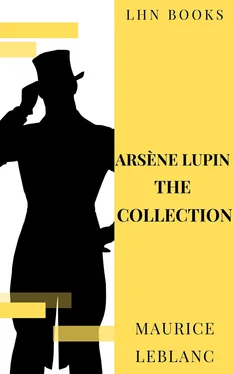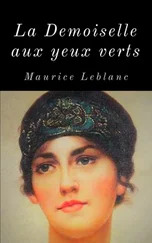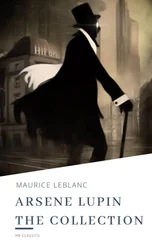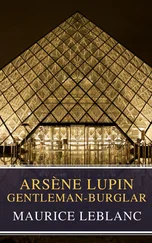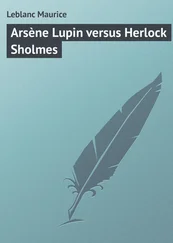Wilson looked at Sholmes to find out if he had the right to admire this act of wanton courage. The Englishman's face was impenetrable; but, a moment later, he called:
"Waiter!"
When the waiter came he ordered soda, beer and whisky. The treaty of peace was signed—until further orders. In a few moments the four men were conversing in an apparently friendly manner.
Herlock Sholmes is a man such as you might meet every day in the business world. He is about fifty years of age, and looks as if he might have passed his life in an office, adding up columns of dull figures or writing out formal statements of business accounts. There was nothing to distinguish him from the average citizen of London, except the appearance of his eyes, his terribly keen and penetrating eyes.
But then he is Herlock Sholmes—which means that he is a wonderful combination of intuition, observation, clairvoyance and ingenuity. One could readily believe that nature had been pleased to take the two most extraordinary detectives that the imagination of man has hitherto conceived, the Dupin of Edgar Allen Poe and the Lecoq of Emile Gaboriau, and, out of that material, constructed a new detective, more extraordinary and supernatural than either of them. And when a person reads the history of his exploits, which have made him famous throughout the entire world, he asks himself whether Herlock Sholmes is not a mythical personage, a fictitious hero born in the brain of a great novelist—Conan Doyle, for instance.
When Arsène Lupin questioned him in regard to the length of his sojourn in France he turned the conversation into its proper channel by saying:
"That depends on you, monsieur."
"Oh!" exclaimed Lupin, laughing, "if it depends on me you can return to England to-night."
"That is a little too soon, but I expect to return in the course of eight or nine days—ten at the outside."
"Are you in such a hurry?"
"I have many cases to attend to; such as the robbery of the Anglo-Chinese Bank, the abduction of Lady Eccleston.... But, don't you think, Monsieur Lupin, that I can finish my business in Paris within a week?"
"Certainly, if you confine your efforts to the case of the blue diamond. It is, moreover, the length of time that I require to make preparations for my safety in case the solution of that affair should give you certain dangerous advantages over me."
"And yet," said the Englishman, "I expect to close the business in eight or ten days."
"And arrest me on the eleventh, perhaps?"
"No, the tenth is my limit."
Lupin shook his head thoughtfully, as he said:
"That will be difficult—very difficult."
"Difficult, perhaps, but possible, therefore certain—"
"Absolutely certain," said Wilson, as if he had clearly worked out the long series of operations which would conduct his collaborator to the desired result.
"Of course," said Herlock Sholmes, "I do not hold all the trump cards, as these cases are already several months old, and I lack certain information and clues upon which I am accustomed to base my investigations."
"Such as spots of mud and cigarette ashes," said Wilson, with an air of importance.
"In addition to the remarkable conclusions formed by Monsieur Ganimard, I have obtained all the articles written on the subject, and have formed a few deductions of my own."
"Some ideas which were suggested to us by analysis or hypothesis," added Wilson, sententiously.
"I wish to enquire," said Arsène Lupin, in that deferential tone which he employed in speaking to Sholmes, "would I be indiscreet if I were to ask you what opinion you have formed about the case?"
Really, it was a most exciting situation to see those two men facing each other across the table, engaged in an earnest discussion as if they were obliged to solve some abstruse problem or come to an agreement upon some controverted fact. Wilson was in the seventh heaven of delight. Herlock Sholmes filled his pipe slowly, lighted it, and said:
"This affair is much simpler than it appeared to be at first sight."
"Much simpler," said Wilson, as a faithful echo.
"I say 'this affair,' for, in my opinion, there is only one," said Sholmes. "The death of the Baron d'Hautrec, the story of the ring, and, let us not forget, the mystery of lottery ticket number 514, are only different phases of what one might call the mystery of the blonde Lady. Now, according to my view, it is simply a question of discovering the bond that unites those three episodes in the same story—the fact which proves the unity of the three events. Ganimard, whose judgment is rather superficial, finds that unity in the faculty of disappearance; that is, in the power of coming and going unseen and unheard. That theory does not satisfy me."
"Well, what is your idea?" asked Lupin.
"In my opinion," said Sholmes, "the characteristic feature of the three episodes is your design and purpose of leading the affair into a certain channel previously chosen by you. It is, on your part, more than a plan; it is a necessity, an indispensable condition of success."
"Can you furnish any details of your theory?"
"Certainly. For example, from the beginning of your conflict with Monsieur Gerbois, is it not evident that the apartment of Monsieur Detinan is the place selected by you, the inevitable spot where all the parties must meet? In your opinion, it was the only safe place, and you arranged a rendezvous there, publicly, one might say, for the blonde Lady and Mademoiselle Gerbois."
"The professor's daughter," added Wilson. "Now, let us consider the case of the blue diamond. Did you try to appropriate it while the Baron d'Hautrec possessed it! No. But the baron takes his brother's house. Six months later we have the intervention of Antoinette Bréhat and the first attempt. The diamond escapes you, and the sale is widely advertised to take place at the Drouot auction-rooms. Will it be a free and open sale? Is the richest amateur sure to carry off the jewel! No. Just as the banker Herschmann is on the point of buying the ring, a lady sends him a letter of warning, and it is the Countess de Crozon, prepared and influenced by the same lady, who becomes the purchaser of the diamond. Will the ring disappear at once? No; you lack the opportunity. Therefore, you must wait. At last the Countess goes to her château. That is what you were waiting for. The ring disappears."
"To reappear again in the tooth-powder of Herr Bleichen," remarked Lupin.
"Oh! such nonsense!" exclaimed Sholmes, striking the table with his fist, "don't tell me such a fairy tale. I am too old a fox to be led away by a false scent."
"What do you mean?"
"What do I mean?" said Sholmes, then paused a moment as if he wished to arrange his effect. At last he said:
"The blue diamond that was found in the tooth-powder was false. You kept the genuine stone."
Arsène Lupin remained silent for a moment; then, with his eyes fixed on the Englishman, he replied, calmly:
"You are impertinent, monsieur."
"Impertinent, indeed!" repeated Wilson, beaming with admiration.
"Yes," said Lupin, "and, yet, to do you credit, you have thrown a strong light on a very mysterious subject. Not a magistrate, not a special reporter, who has been engaged on this case, has come so near the truth. It is a marvellous display of intuition and logic."
"Oh! a person has simply to use his brains," said Herlock Sholmes, nattered at the homage of the expert criminal.
"And so few have any brains to use," replied Lupin. "And, now, that the field of conjectures has been narrowed down, and the rubbish cleared away——"
"Well, now, I have simply to discover why the three episodes were enacted at 25 rue Clapeyron, 134 avenue Henri-Martin, and within the walls of the Château de Crozon and my work will be finished. What remains will be child's play. Don't you think so?"
Читать дальше
